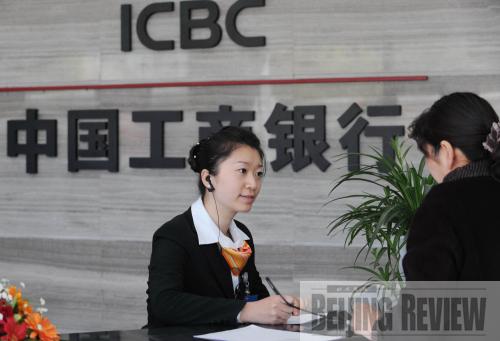|
 |
|
SERVICE FEES UP: Customers must accept rising bank charges, as they are powerless against giant commercial banks (XINHUA) |
Shortsighted Action
By the end of May, China had seen negative growth in foreign direct investment for seven consecutive months. In response, the Ministry of Commerce and the State Foreign Exchange Administration reportedly have proposed to relax controls over foreign investment in the Chinese real estate market.
What is the direct reason for the decline in foreign investment? Is it that foreign-funded companies are retreating from overseas markets because of the global economic crisis or that China's policies drive away investors? Obviously, the former is the reason. When the global economy recovers, foreign investment in China will naturally rebound. Thus, the country does not need to dramatically change its policies on foreign investment. More importantly, excessively loose foreign investment policies are dangerous considering the risk of foreign capital flight in case of financial turmoil.
Meanwhile, since the beginning of this year, a huge amount of bank loans have entered the real estate arena, while some overseas investment banks are preparing massive capital injection. In this case, if restrictions on foreign capital access to China's housing market are loosened, housing prices will remain excessively high, giving birth to bigger bubbles.
Actually, wherever there are lucrative industries, foreign investors will be circling. What we hope they will do is to join China's efforts to revive the real economy and create more jobs, instead of inflating property bubbles and aggravating financial risks.
The Beijing News
Save Energy, Stay Hot
In summer, air-conditioners seem a must in homes and offices. People tend to keep the temperature very low, especially at night and often have to sleep under quilts.
The cost of energy largely depends on a person's lifestyle. The financial crisis is, to some extent, a crisis resulting from excessive energy consumption. In China, some rich people reside in big houses and drive cars with high emissions and white-collar workers keep their offices icy cool.
Although China has done a lot of work to develop renewable energy and we have saved energy and cut emissions, we still lag behind in the building of environment-friendly communities.
Global climate change, frequent natural disasters and the deterioration of urban environment all pose a new threat to sustainable economic and social development.
As responsible citizens, we must always remember the importance of energy conservation and try to save energy in daily life, like saving electric power, refusing excessive commodity packaging, etc.
Qilu Evening News
Banquet Costs
According to the Blue Paper on the Catering Industry jointly issued by the Chinese Academy of Social Sciences and the China Cuisine Association, China's catering industry has maintained good momentum despite the economic recession. The industry's total retail sales in 2008 stood at 1.54 trillion yuan ($220 billion), which accounted for 15.8 percent of total retail sales of consumer goods for the year. However, in the face of the huge catering expenditure, we can't help asking: How much is paid for banquets at the government's expense?
Every year, the government is estimated to pay more than 100 billion yuan ($14.3 billion) for official banquets, which is half of the investment in the Three Gorges Dam project and almost the annual cost of the country's rural compulsory education.
By no means should government expenses remain a secret. The public has the right to know: Of the huge expenses on catering, how much is for official banquets? Relevant departments must try to find out how officials manage to have countless banquets at the government's expense, so as to block the channels for abuse of taxpayers' money.
Procuratorial Daily
Monopoly Again
The Industrial and Commercial Bank of China (ICBC), the world's largest lender by market value, recently announced it would increase its charges on 20 personal banking services at home, including trans-regional deposits, cash withdrawals and foreign currency remittance. Fees on trans-regional deposits or cash withdrawals, for example, will go up from 50 yuan ($7.2) to 100 yuan ($14.4) per transaction. The purpose of the adjustments is said to be to control costs and improve services.
The public has long complained about the many fees charged by state-owned commercial banks. But the people are powerless against these bank giants. ICBC is now the most profitable bank in Asia and its aim is to make itself the most profitable bank in the world. However, the aim is not based on the improvement of internal management and operational performance, but on remarkably raising service charges.
It's not that state-owned commercial banks are not allowed to raise fees. But the adjustments must be based on strong reasons and only take effect after going through strict regulatory approval procedures.
Like state-owned enterprises, state-owned commercial banks have the monopoly in the market and they also enjoy government protection. Thus, they are able to maximize their profit margins. The fact that they do not need to give reasons when raising service charges is one more example of how much consumers suffer from monopolies.
Changjiang Daily | 